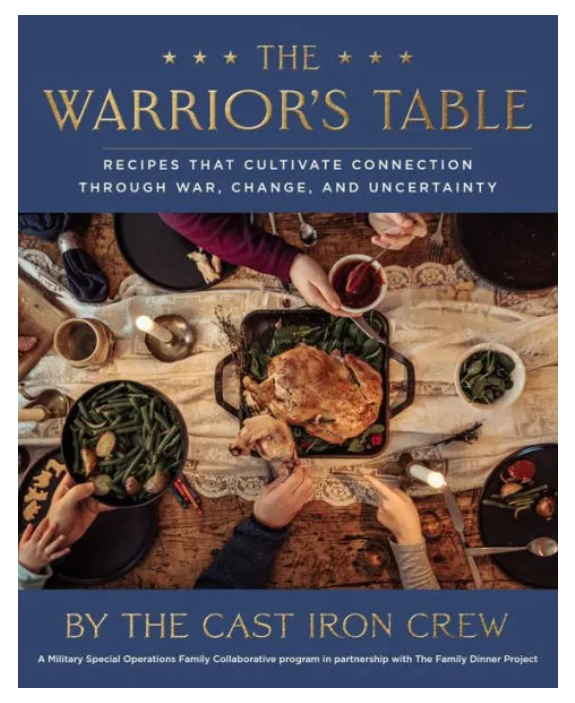New Book Brings The Family Dinner Project to Military Special Operations Families

div.nsl-container[data-align="left"] { text-align: left; } div.nsl-container[data-align="center"] { text-align: center; } div.nsl-container[data-align="right"] { text-align: right; } div.nsl-container div.nsl-container-buttons a[data-plugin="nsl"] { text-decoration: none; box-shadow: none; border: 0; } div.nsl-container .nsl-container-buttons { display: flex; padding: 5px 0; } div.nsl-container.nsl-container-block .nsl-container-buttons { display: inline-grid; grid-template-columns: minmax(145px, auto); } div.nsl-container-block-fullwidth .nsl-container-buttons { flex-flow: column; align-items: center; } div.nsl-container-block-fullwidth .nsl-container-buttons a, div.nsl-container-block .nsl-container-buttons a { flex: 1 1 auto; display: block; margin: 5px 0; width: 100%; } div.nsl-container-inline { margin: -5px; text-align: left; } div.nsl-container-inline .nsl-container-buttons { justify-content: center; flex-wrap: wrap; } div.nsl-container-inline .nsl-container-buttons a { margin: 5px; display: inline-block; } div.nsl-container-grid .nsl-container-buttons { flex-flow: row; align-items: center; flex-wrap: wrap; } div.nsl-container-grid .nsl-container-buttons a { flex: 1 1 auto; display: block; margin: 5px; max-width: 280px; width: 100%; } @media only screen and (min-width: 650px) { div.nsl-container-grid .nsl-container-buttons a { width: auto; } } div.nsl-container .nsl-button { cursor: pointer; vertical-align: top; border-radius: 4px; } div.nsl-container .nsl-button-default { color: #fff; display: flex; } div.nsl-container .nsl-button-icon { display: inline-block; } div.nsl-container .nsl-button-svg-container { flex: 0 0 auto; padding: 8px; display: flex; align-items: center; } div.nsl-container svg { height: 24px; width: 24px; vertical-align: top; } div.nsl-container .nsl-button-default div.nsl-button-label-container { margin: 0 24px 0 12px; padding: 10px 0; font-family: Helvetica, Arial, sans-serif; font-size: 16px; line-height: 20px; letter-spacing: .25px; overflow: hidden; text-align: center; text-overflow: clip; white-space: nowrap; flex: 1 1 auto; -webkit-font-smoothing: antialiased; -moz-osx-font-smoothing: grayscale; text-transform: none; display: inline-block; } div.nsl-container .nsl-button-google[data-skin="light"] { box-shadow: inset 0 0 0 1px #747775; color: #1f1f1f; } div.nsl-container .nsl-button-google[data-skin="dark"] { box-shadow: inset 0 0 0 1px #8E918F; color: #E3E3E3; } div.nsl-container .nsl-button-google[data-skin="neutral"] { color: #1F1F1F; } div.nsl-container .nsl-button-google div.nsl-button-label-container { font-family: "Roboto Medium", Roboto, Helvetica, Arial, sans-serif; } div.nsl-container .nsl-button-apple .nsl-button-svg-container { padding: 0 6px; } div.nsl-container .nsl-button-apple .nsl-button-svg-container svg { height: 40px; width: auto; } div.nsl-container .nsl-button-apple[data-skin="light"] { color: #000; box-shadow: 0 0 0 1px #000; } div.nsl-container .nsl-button-facebook[data-skin="white"] { color: #000; box-shadow: inset 0 0 0 1px #000; } div.nsl-container .nsl-button-facebook[data-skin="light"] { color: #1877F2; box-shadow: inset 0 0 0 1px #1877F2; } div.nsl-container .nsl-button-spotify[data-skin="white"] { color: #191414; box-shadow: inset 0 0 0 1px #191414; } div.nsl-container .nsl-button-apple div.nsl-button-label-container { font-size: 17px; font-family: -apple-system, BlinkMacSystemFont, "Segoe UI", Roboto, Helvetica, Arial, sans-serif, "Apple Color Emoji", "Segoe UI Emoji", "Segoe UI Symbol"; } div.nsl-container .nsl-button-slack div.nsl-button-label-container { font-size: 17px; font-family: -apple-system, BlinkMacSystemFont, "Segoe UI", Roboto, Helvetica, Arial, sans-serif, "Apple Color Emoji", "Segoe UI Emoji", "Segoe UI Symbol"; } div.nsl-container .nsl-button-slack[data-skin="light"] { color: #000000; box-shadow: inset 0 0 0 1px #DDDDDD; } div.nsl-container .nsl-button-tiktok[data-skin="light"] { color: #161823; box-shadow: 0 0 0 1px rgba(22, 24, 35, 0.12); } div.nsl-container .nsl-button-kakao { color: rgba(0, 0, 0, 0.85); } .nsl-clear { clear: both; } .nsl-container { clear: both; } .nsl-disabled-provider .nsl-button { filter: grayscale(1); opacity: 0.8; } /*Button align start*/ div.nsl-container-inline[data-align="left"] .nsl-container-buttons { justify-content: flex-start; } div.nsl-container-inline[data-align="center"] .nsl-container-buttons { justify-content: center; } div.nsl-container-inline[data-align="right"] .nsl-container-buttons { justify-content: flex-end; } div.nsl-container-grid[data-align="left"] .nsl-container-buttons { justify-content: flex-start; } div.nsl-container-grid[data-align="center"] .nsl-container-buttons { justify-content: center; } div.nsl-container-grid[data-align="right"] .nsl-container-buttons { justify-content: flex-end; } div.nsl-container-grid[data-align="space-around"] .nsl-container-buttons { justify-content: space-around; } div.nsl-container-grid[data-align="space-between"] .nsl-container-buttons { justify-content: space-between; } /* Button align end*/ /* Redirect */ #nsl-redirect-overlay { display: flex; flex-direction: column; justify-content: center; align-items: center; position: fixed; z-index: 1000000; left: 0; top: 0; width: 100%; height: 100%; backdrop-filter: blur(1px); background-color: RGBA(0, 0, 0, .32);; } #nsl-redirect-overlay-container { display: flex; flex-direction: column; justify-content: center; align-items: center; background-color: white; padding: 30px; border-radius: 10px; } #nsl-redirect-overlay-spinner { content: ''; display: block; margin: 20px; border: 9px solid RGBA(0, 0, 0, .6); border-top: 9px solid #fff; border-radius: 50%; box-shadow: inset 0 0 0 1px RGBA(0, 0, 0, .6), 0 0 0 1px RGBA(0, 0, 0, .6); width: 40px; height: 40px; animation: nsl-loader-spin 2s linear infinite; } @keyframes nsl-loader-spin { 0% { transform: rotate(0deg) } to { transform: rotate(360deg) } } #nsl-redirect-overlay-title { font-family: -apple-system, BlinkMacSystemFont, "Segoe UI", Roboto, Oxygen-Sans, Ubuntu, Cantarell, "Helvetica Neue", sans-serif; font-size: 18px; font-weight: bold; color: #3C434A; } #nsl-redirect-overlay-text { font-family: -apple-system, BlinkMacSystemFont, "Segoe UI", Roboto, Oxygen-Sans, Ubuntu, Cantarell, "Helvetica Neue", sans-serif; text-align: center; font-size: 14px; color: #3C434A; } /* Redirect END*//* Notice fallback */ #nsl-notices-fallback { position: fixed; right: 10px; top: 10px; z-index: 10000; } .admin-bar #nsl-notices-fallback { top: 42px; } #nsl-notices-fallback > div { position: relative; background: #fff; border-left: 4px solid #fff; box-shadow: 0 1px 1px 0 rgba(0, 0, 0, .1); margin: 5px 15px 2px; padding: 1px 20px; } #nsl-notices-fallback > div.error { display: block; border-left-color: #dc3232; } #nsl-notices-fallback > div.updated { display: block; border-left-color: #46b450; } #nsl-notices-fallback p { margin: .5em 0; padding: 2px; } #nsl-notices-fallback > div:after { position: absolute; right: 5px; top: 5px; content: '\00d7'; display: block; height: 16px; width: 16px; line-height: 16px; text-align: center; font-size: 20px; cursor: pointer; }
